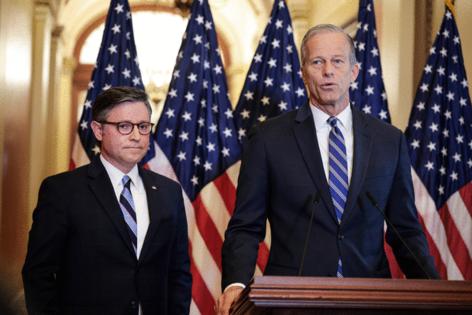Editorial: Republicans may find they need to get behind the ACA
Published in Op Eds
House Republicans’ reconciliation bill seeks to pay for $5 trillion of tax cuts by slashing health-care spending, potentially leaving millions of Americans uninsured. The job of averting this self-inflicted disaster now falls to the Senate.
The legislation seeks to cut $793 billion from Medicaid, the health program for the poor. Half this sum will come from requiring beneficiaries under 65 to work, look for employment or volunteer, with some exemptions. The new rules are slated to start in late 2026 — moved up from 2029 — after some lawmakers objected that savings wouldn’t materialize soon enough.
In the best of circumstances, introducing a work requirement would take meticulous planning and investment. Past experiments are hardly encouraging, and a rushed deadline will only make things worse. The Congressional Budget Office estimates that 4.8 million people could become uninsured from this provision alone.
Policies that help those who lose Medicaid get coverage elsewhere would make sense. Yet by hobbling the Affordable Care Act, the reconciliation bill makes that tougher, too. President Barack Obama’s signature law sought to reduce costs and the number of uninsured, partly by expanding eligibility for Medicaid. Worried that such ambitions would inflate spending, Republicans spent years trying to repeal the law yet failed to come up with a viable alternative.
This time, lawmakers didn’t seek to dismantle the ACA. Rather, through a combination of technical reforms, the bill makes enrollment vastly more difficult — even more so for those who fail Medicaid eligibility checks. The CBO estimates such changes would save $268 billion over a decade at the cost of $3.1 million becoming uninsured.
The ACA’s critics aren’t wrong to worry about its costs. Federal spending on the program has surged since the pandemic, when Congress increased and expanded eligibility for premium subsidies. The ACA nevertheless has succeeded in reducing the nation’s uninsured rate and, absent deeper reform, remains the best option for people who lose access to Medicaid. One of the biggest flaws of the reconciliation bill may be its failure to consider that these two programs should work together.
Shifting more poor Americans to the ACA from Medicaid doesn’t have to be a fiscal blowout. By targeting subsidies toward the lowest-income enrollees, and phasing them out for higher earners, lawmakers can reduce federal spending and avoid large coverage losses.
Indeed, one prominent conservative thinker has noted that the government spends more per person on the Medicaid expansion population than on premium tax credits for the lowest-income enrollees. Optimally, lawmakers would allow the 1.5 million Americans in states that chose not to expand Medicaid to qualify for subsidies. This population — which earns too much to qualify for Medicaid and too little to get premium tax credits — could grow with work requirements in place.
The opportunity to restructure ACA subsidies couldn’t come at a better time: Pandemic-era enhancements are set to expire in December, sending premiums up 75% on average. Insurers, for their part, set rates in September. Should the reconciliation bill pass as is, and the credits expire, Republicans not only could face an additional 4 million more uninsured — in an election year, no less — but the cost of uncompensated care might far exceed projected savings as people seek costly emergency services at taxpayers’ expense. Some lawmakers are starting to acknowledge that a compromise will be needed, and soon.
House Republicans’ focus on squeezing individual health programs appears to have blinded them to the broader impact of the cuts they’re proposing. Much as it might pain them, senators should recognize that a smoother on-ramp to the ACA is the best way to minimize coverage losses in Medicaid. Now’s their chance to deliver.
_____
The Editorial Board publishes the views of the editors across a range of national and global affairs.
_____
©2025 Bloomberg L.P. Visit bloomberg.com/opinion. Distributed by Tribune Content Agency, LLC.

























































Comments